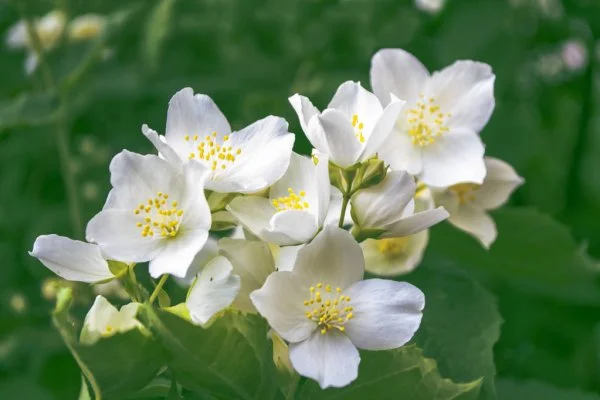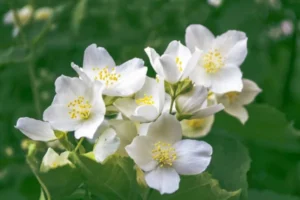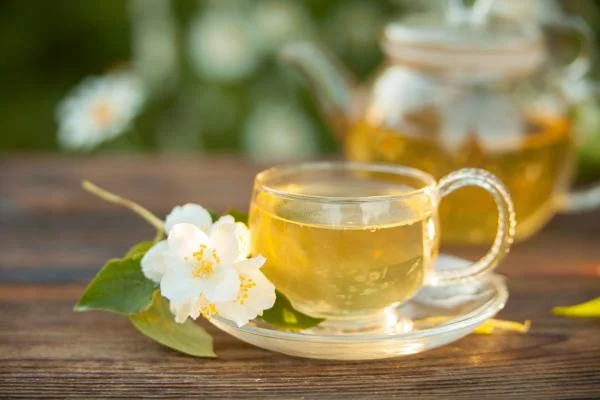1.- The historical origin of Jasmine
The historical origin of Jasmine
- Find out more about this flower "Jasmine"-
1.1- Where does it come from Jasmine?
Jasmine is a shrub native to tropical and subtropical regions, and is known for its beautiful flowers. These flowers can be of different colours, such as yellow, blue or pink, although the most common colour is white. In addition to its beauty, jasmine is also known for its sweet, pleasant and intense aroma. It is a plant that is widely used in the world of cosmetics and perfumery because of its unique fragrance.
Jasmine essential oil is one of the most valuable oils in the perfume industry, as its scent is widely used in the production of perfumes, creams, lotions and other beauty products. In fact, the scent of jasmine is said to be able to relax and relieve anxiety, which is why it is also used in aromatherapy.

In addition, the jasmine flower has a symbolic meaning in different cultures, being recognised as a symbol of love, purity and humility. In India, for example, it is considered a sacred flower and is used in religious ceremonies.
In short, jasmine is a plant that not only stands out for its beauty and aroma, but also has multiple uses and cultural meanings. It is a true jewel of nature.
1.2- The legend of the Princess Jasmine
The legend of its origin tells us how Princess Jasmine, daughter of the king called from a distant kingdom, was destined to marry a rich and powerful prince to ensure the political stability of her family. However, she longed to marry for love and not for convenience. One day, while strolling through the palace gardens, Jasmine encountered a handsome and humble young man, who turned out to be a travelling merchant.
Despite their class difference, they fell madly in love with each other and, after several secret meetings, decided to marry secretly in an intimate ceremony in the palace gardens. Jasmine dressed in a veil of flowers and met her beloved at the garden fountain.
All seemed to be going well until Jasmine's father discovered his daughter's secret marriage and, enraged, surely locked her in her room in the castle to prevent her from seeing her husband again. But Jasmine was unwilling to accept her fate, and one night she escaped from her confinement into the dreaded desert.
Learn more about this flower "Jasmine".
Where does it come from Jasmine?
Jasmine is a shrub native to tropical and subtropical regions, and is known for its beautiful flowers. These flowers can be of different colours, such as yellow, blue or pink, although the most common colour is white. In addition to its beauty, jasmine is also known for its sweet, pleasant and intense aroma. It is a plant that is widely used in the world of cosmetics and perfumery because of its unique fragrance.
Jasmine essential oil is one of the most valuable oils in the perfume industry, as its scent is widely used in the production of perfumes, creams, lotions and other beauty products. In fact, the scent of jasmine is said to be able to relax and relieve anxiety, which is why it is also used in aromatherapy.

In addition, the jasmine flower has a symbolic meaning in different cultures, being recognised as a symbol of love, purity and humility. In India, for example, it is considered a sacred flower and is used in religious ceremonies.
In short, jasmine is a plant that not only stands out for its beauty and aroma, but also has multiple uses and cultural meanings. It is a true jewel of nature.
The legend of the Princess Jasmine
The legend of its origin tells us how Princess Jasmine, daughter of the king called from a distant kingdom, was destined to marry a rich and powerful prince to ensure the political stability of her family. However, she longed to marry for love and not for convenience. One day, while strolling through the palace gardens, Jasmine encountered a handsome and humble young man, who turned out to be a travelling merchant.
Despite their class difference, they fell madly in love with each other and, after several secret meetings, decided to marry secretly in an intimate ceremony in the palace gardens. Jasmine dressed in a veil of flowers and met her beloved at the garden fountain.
All seemed to be going well until Jasmine's father discovered his daughter's secret marriage and, enraged, surely locked her in her room in the castle to prevent her from seeing her husband again. But Jasmine was unwilling to accept her fate, and one night she escaped from her confinement into the dreaded desert.
2.- The Jasmine and its multiple properties
Jasmine and its multiple properties
- Healing results of Jasmine
2.1- Its incredible use in medicine
The application of jasmine in medicine dates back several centuries, being one of the most widely used flowers in the medicinal field. In fact, its use dates back to ancient Persia and India, where it was used to treat a wide variety of diseases.
In terms of application, jasmine can be used in a variety of ways, depending on the effect we wish to obtain on our health. For example, it can be applied to the skin on wounds to heal them, thanks to its antiseptic and healing properties. In addition, it also helps to make marks and scars disappear, thanks to its skin regenerating capacity.
On the other hand, jasmine can also be ingested, thus relieving digestive problems and insomnia. In fact, jasmine tea is very popular in Asia, as it is believed to help sleep and reduce anxiety. In addition, jasmine is a natural anti-inflammatory, so it can be useful in cases of pain and inflammation.
Healing results of Jasmine
Its incredible use
in medicine
The application of jasmine in medicine dates back several centuries, being one of the most widely used flowers in the medicinal field. In fact, its use dates back to ancient Persia and India, where it was used to treat a wide variety of diseases.
In terms of application, jasmine can be used in a variety of ways, depending on the effect we wish to obtain on our health. For example, it can be applied to the skin on wounds to heal them, thanks to its antiseptic and healing properties. In addition, it also helps to make marks and scars disappear, thanks to its skin regenerating capacity.
On the other hand, jasmine can also be ingested, thus relieving digestive problems and insomnia. In fact, jasmine tea is very popular in Asia, as it is believed to help sleep and reduce anxiety. In addition, jasmine is a natural anti-inflammatory, so it can be useful in cases of pain and inflammation.
- Therapeutic effects
2.2- The relaxing use Jasmine in aromatherapy
Jasmine is a plant considered a reference in aromatherapy, thanks to its powerful and sweet aroma. Its fragrance produces a feeling of tranquillity that helps to reduce stress, anxiety and improve concentration. In addition, this plant has therapeutic properties that can elevate our mood and induce greater optimism, eliminating emotional blockages.
Among the benefits of jasmine is its ability to relieve respiratory problems such as irritating coughs. This plant is also very useful for people with sleeping difficulties, as its soothing scent can help them fall asleep more easily.

If you are looking for a natural remedy to improve your mood and reduce stress, anxiety and sleeping difficulties, jasmine is an excellent choice. Incorporate this plant into your daily routine through essential oils, teas, infusions or simply by its presence in your home, and experience its benefits for your physical and emotional well-being.
You can buy the jasmine incense in our online incense shop at this link.
Therapeutic effects
The relaxing use Jasmine in aromatherapy
Jasmine is a plant considered a reference in aromatherapy, thanks to its powerful and sweet aroma. Its fragrance produces a feeling of tranquillity that helps to reduce stress, anxiety and improve concentration. In addition, this plant has therapeutic properties that can elevate our mood and induce greater optimism, eliminating emotional blockages.
Among the benefits of jasmine is its ability to relieve respiratory problems such as irritating coughs. This plant is also very useful for people with sleeping difficulties, as its soothing scent can help them fall asleep more easily.

If you are looking for a natural remedy to improve your mood and reduce stress, anxiety and sleeping difficulties, jasmine is an excellent choice. Incorporate this plant into your daily routine through essential oils, teas, infusions or simply by its presence in your home, and experience its benefits for your physical and emotional well-being.
You can buy the jasmine incense in our online incense shop at this link.
2.3- The incredible infusion
of Jasmine
The jasmine infusion is well known and became popular in the Ming dynasty (China)when floral motifs were in vogue. Popularly jasmine was infused with green teabecause the jasmine flowers add their unique aroma to the tea and enhance its benefits. Among them, it can be highlighted that it is antibacterial y antioxidant. Improves health and relieves cold symptoms. It also helps to relieve stress and anxiety, generating a sense of peace and tranquillity.

The incredible infusion
of Jasmine
The jasmine infusion is well known and became popular in the Ming dynasty (China)when floral motifs were in vogue. Popularly jasmine was infused with green teabecause the jasmine flowers add their unique aroma to the tea and enhance its benefits. Among them, it can be highlighted that it is antibacterial y antioxidant. Improves health and relieves cold symptoms. It also helps to relieve stress and anxiety, generating a sense of peace and tranquillity.

3.- Main properties and characteristics of Jasmine
Main properties and characteristics of Jasmine
- Jasmine has the ability to reduce stress and anxiety, generating peace and well-being.
- Improves concentration and focus, enables people to be more productive.
- Its wonderful scent is full of optimism and is able to lift your mood.
- Excellent expectorant, relieves irritating coughs and prevents respiratory diseases.
- It has a relaxing effect, eliminates insomnia and helps you to rest and sleep soundly.
- Contains antioxidants that reduce the risk of chronic diseases.
- It has antibacterial properties that help control and eradicate viruses and bacteria.
- Jasmine has the ability to reduce stress and anxiety, generating peace and well-being.
- Improves concentration and focus, enables people to be more productive.
- Its wonderful scent is full of optimism and is able to lift your mood.
- Excellent expectorant, relieves irritating coughs and prevents respiratory diseases.
- It has a relaxing effect, eliminates insomnia and helps you to rest and sleep soundly.
- Contains antioxidants that reduce the risk of chronic diseases.
- It has antibacterial properties that help control and eradicate viruses and bacteria.
Properties of the Jasmine
Tranquilliser
Jasmine has the ability to reduce stress and anxiety, creating an atmosphere of peace and well-being. It also helps to calm and relax your nervous system.
Concentration
It stimulates your brain by improving concentration and focus in your daily activities, allowing people to be more active and productive.
State of mind
Its wonderful scent is full of optimism and is able to lift your mood and improve your mood. It helps to improve your emotional state and make you feel better.
Expectorant
Very useful for the respiratory system as it is an excellent expectorant. It also relieves irritating coughs and prevents respiratory diseases.
Insomnia
It has a relaxing effect thanks to its sedative properties, which helps to prevent insomnia. An ally for falling asleep and sleeping soundly, calming nervous states.
Antioxidant
It contains antioxidants that improve our immune system. It also reduces the risk of chronic diseases and protects you on a daily basis.
Antibacterial
It has antibacterial properties that help control and eradicate viruses and bacteria. Counteracts diseases spread by airborne viruses.
For more information visit us on our social networks or our Hindu and spiritual blog.
We are grateful for the divine inspiration of our Guru
Swami Satynanda Saraswati
Donating 10% of the profits from this shop to partner Advaitadya (Kailash Ashram)

